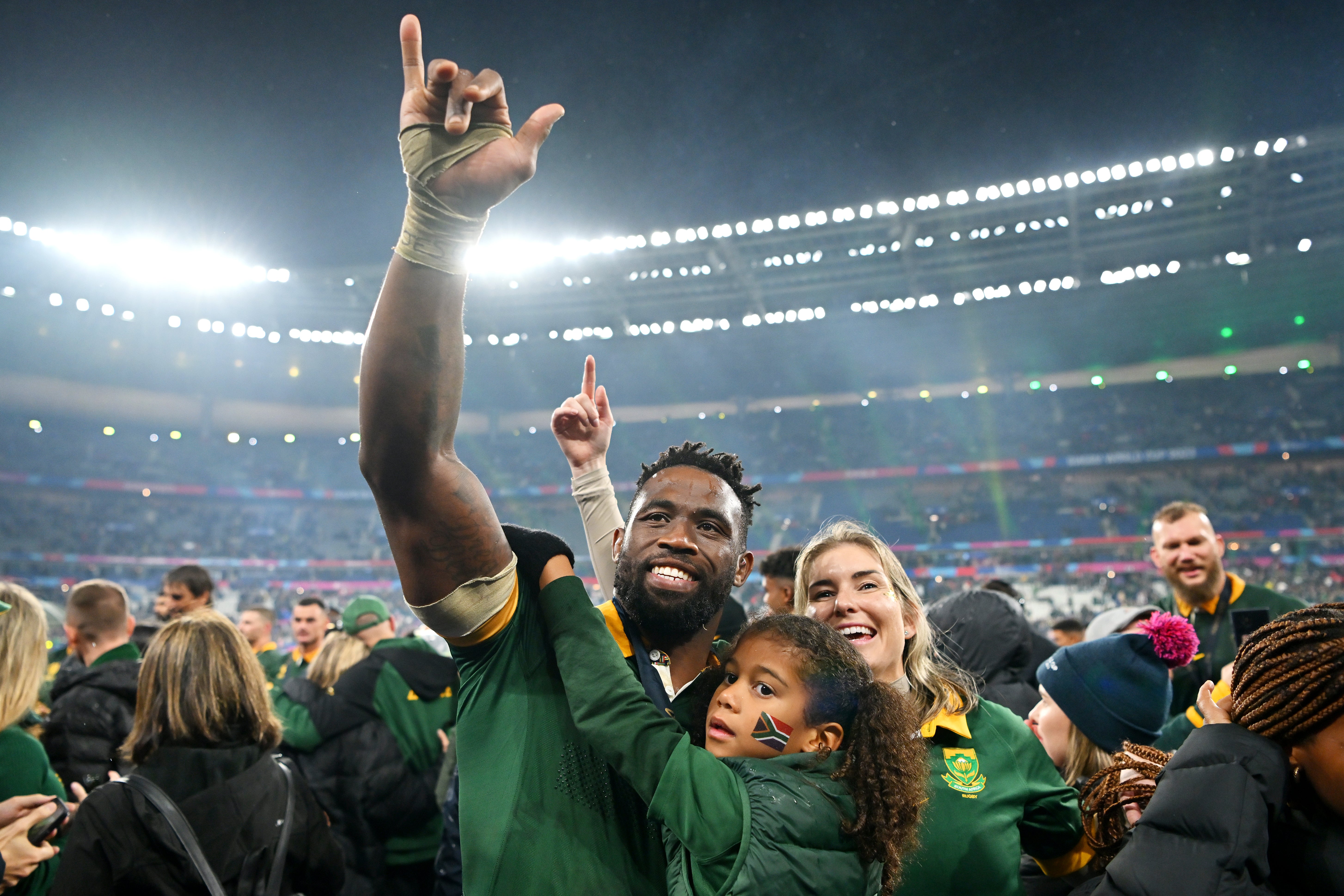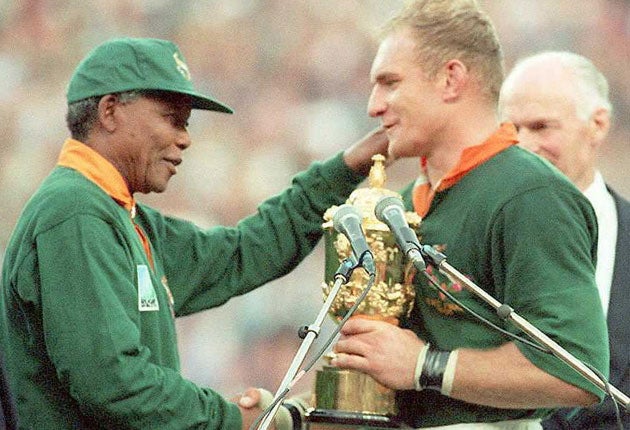Siya Kolisi celebrated a second Rugby World Cup win as Springboks captain
He has been honest about previous indiscretions – “some people know how I was in the past and I’m not a saint at all,” Kolisi admitted in a candid 2021 interview. “I’m a sinner trying to be the best he can be every day” – and you only need to ask his teammates to understand the impact he has on them.
“It is something from the outside that you don’t necessarily understand,” said lock Jean Kleyn. “His entire journey epitomises the South African dream, striving through the difficult things, what other people would call impossible.”
Captaining the Springboks is no easy task at the best of times. Much like South Africa itself, the squad is a melting pot of cultures, languages, races and social and economic backgrounds. When Kolisi first took on the role in 2018, he also had the additional burden of being the team’s first-ever Black skipper.
It was then head coach, now director of rugby, Rassie Erasmus who made the call and last year, he explained the magnitude of the decision.
“People outside of South Africa might not understand this fully but having a Black Springbok captain is a flammable situation in our country,” said Erasmus. “I lost a lot of friends when I made Siya captain.
“There was a lot of nastiness. Before the World Cup, my daughters’ friends’ parents would say, ‘Tell that f****** father of yours to stop sucking up for a pay cheque.’ People said it was political. The fight to get people to believe in Siya was a real struggle.”
Kolisi became the Springboks first Black captain in 2018
The 1995 Rugby World Cup final showed a path to a united South Africa, as the image of Nelson Mandela decked out in full Springboks regalia presenting the trophy to skipper Francois Pienaar became rugby’s most iconic moment. It was a symbol of hope that the country – Black and white together – could move on from its past.
Life is rarely that straightforward of course and, like every other nation on earth, South Africa remains an imperfect society. But the Springboks, with Kolisi as the beacon of hope leading the way, still represent something better.
“Siya transcends the game of rugby – he’s a symbol of hope for so many,” explained ex-Springbok prop Tendai Mtawarira, who won the 2019 World Cup alongside Kolisi. “He came from nothing and became somebody iconic in the public eye. He means so much for South Africa.”
That sort of burden would crush most people but it has only powered Kolisi. With a nation depending on him, he has maintained his position as a world-class flanker and leader on the pitch.
Kolisi has thrived despite the burden of his role
His physical ball-carrying puts the Springboks on the front foot and his speed around the park enables him to capitalise on space, even out wide, while his deft offloads and surprising fleetness of foot have made him a nightmare for defenders to tackle. Over the past couple of years, he has continued to evolve, becoming more of a rock in defence and developing into a jackal threat at the breakdown.
This past weekend of course, he made history by following in Richie McCaw’s footsteps and becoming only the second captain to lift the men’s Rugby World Cup on two occasions. His accomplishment moved him clearly beyond Pienaar and 2007 World Cup-winning skipper John Smit as the Springboks’ greatest ever and there is surely only a hair’s breadth between him and McCaw now in the battle to be recognised as the greatest of all time.
It was fitting that a Kolisi-led team lifted the Webb Ellis Cup by remarkably winning three knockout games in a row by just a single point. When the going gets tough and crunch time arrives, South Africa follow their captain’s lead and somehow dig deeper than the opposition.
The All Blacks desperately, desperately wanted to win that final at the Stade de France but, perhaps, the Springboks needed to and that made the difference.
As is always the way with the Springboks, it wasn’t just about the rugby but an important message sent to the country as a whole, leaving Kolisi to echo the sentiments of Mandela from 1995 and urging the country to unite around rugby.
Kolisi echoed the sentiments of Nelson Mandela from 1995
“There’s so much going wrong in our country, we are the last line of defence,” explained Kolisi. “There’s so much division in the country, it is possible to work together as South Africans, not just on the rugby field, but in life in general. As soon as we work together, all is possible, no matter in what sphere – in the field, in offices, it shows what we can do. We can’t go away from that.
“1995, without that I wouldn’t be here. For people who look like me, I’ve got a job to give whatever I can to the jersey, to show they can get opportunities like this.”
From being seen as a political appointment as captain to inspiring a nation in two World Cup finals, Kolisi’s journey has been remarkable and will continue well beyond the end of his playing career.
As for when that end comes, who knows? He’ll be 36 years old by the time the 2027 World Cup rolls around and it feels unlikely that he’ll be in position to try and skipper the Boks to an unprecedented three-peat of titles.
Not that any good usually comes from writing Siya Kolisi off. A Saturday night in Paris secured his legacy for all eternity and begs the question of what comes next for rugby’s greatest leader.
Source: Read Full Article



